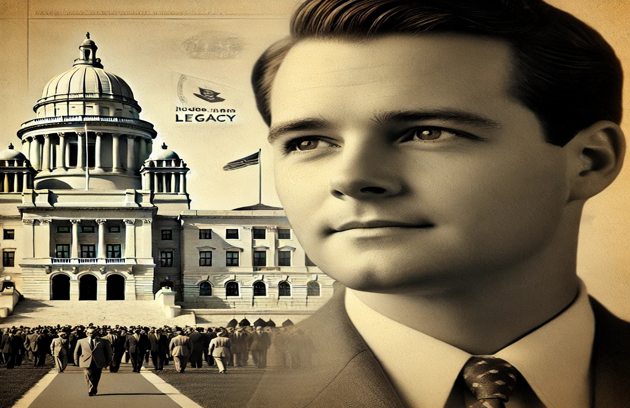The name Thomas L. O’Connell is evidence of a life well-lived and a legacy that inspires Rhode Island citizens still. O’Connell died in 1974 and made a lasting impact on his hometown, influencing the civic, cultural, and educational scene of the state. We explore thoroughly in this article the life, achievements, and ongoing effect of Thomas L. O’Connell, a man whose memory lives on via the many lives he touched.
Who Was Thomas L. O’Connell?
Thomas L. O’Connell was not a national personality or political star, but he was widely recognized in Rhode Island as a voice of reason and defender of the working people. He participated in the state assembly during a period of major change as Rhode Island was rebuilding its infrastructure and post-war economy.
While records of his specific achievements are sometimes scarce, those who knew or studied his era describe O’Connell as:
- A dedicated legislator who championed public education and workers’ rights
- A bipartisan leader, known for his ability to bring people together
- A quiet hero, more concerned with solutions than with spotlight
In a political climate that can feel increasingly divisive today, it’s refreshing—and vital—to reflect on leaders like O’Connell who truly put community first.
The Rhode Island of O’Connell’s Time
Understanding Rhode Island of the 1950s and 60s allows one to value O’Connell’s legacy. The state was juggling issues of urban expansion, changing economic patterns from manufacturing to service-based businesses, and mounting calls for educational change.
Key Issues of the Era:
- Rising inequality in urban vs. rural communities
- Underfunded public school systems
- Labor union tensions
- Infrastructure needing modernization
Thomas L. O’Connell participated in helping to address these developments, not only observing them. His pragmatic yet moral attitude helped him to forge consensus and work across political boundaries—something badly lacking in the politics of today.
His Lasting Contributions to Rhode Island
Let’s break down what makes Remembering Thomas L. O’Connell (D. 1974): A Rhode Island Legacy is such a meaningful effort. Even without a lengthy list of personal memoirs or headlines, O’Connell’s impact can be traced through several key contributions:
1. Education Advocacy
He pushed for more equitable funding across public schools, arguing that every child—regardless of zip code—deserved access to quality education.
2. Infrastructure Development
O’Connell was involved in legislative initiatives to modernize roads, bridges, and public utilities that supported both economic growth and public safety.
3. Support for Labor and Unions
Coming from a working-class background, O’Connell understood the importance of fair wages, safe working conditions, and union protections.
4. Civic Engagement
He encouraged local involvement in politics, often holding town hall-style meetings and listening sessions—decades before such things were trendy.
Why His Legacy Still Matters
Here’s the big question: Why remember a man who passed away in 1974?
Well, because remembering Thomas L. O’Connell (D. 1974): A Rhode Island Legacy is a reminder that good leadership doesn’t always come with fanfare. It can be quiet, consistent, and deeply effective. In a time when trust in political institutions is declining, figures like O’Connell are proof that politics can be a force for good.
Lessons from O’Connell’s Life:
- Service should outweigh self-interest
- Listening matters as much as speaking
- Real change happens at the local level
Voices from the Past: Stories About O’Connell
While his biography may not line bookstore shelves, personal anecdotes from those who knew O’Connell help paint a richer picture:
- A former school principal remembered how O’Connell helped secure emergency funding when the school was close to shutting down.
- An elderly neighbor once said, “He’d shovel your snow before he shook your hand for votes.”
- A political rival praised him in a eulogy, calling him “the rare kind of opponent who made you better by disagreeing with you.”
These stories don’t just describe a man. They describe a legacy.
Comparing Leadership Styles: Then and Now
O’Connell led with community spirit and sensitivity, something quite different from the sometimes polarized world of today. O’Connell’s narrative reminds us that effect is about intention, not always about influence, even as the media favors billionaires and superstars.
Where Have Leaders Like O’Connell Gone?
Social media politics and viral headlines abound in our day. Leaders like Thomas L. O’Connell traveled door to door rather than going viral.
And that’s the real difference.
FAQs About Thomas L. O’Connell
Who was Thomas L. O’Connell?
Remembered for his community-driven attitude and efforts in education, labor rights, and infrastructure, he was a Rhode Island politician and civic leader who died in 1974.
Why don’t more people know about him?
O’Connell was not self-promotional or flamboyant. His narrative hasn’t gotten much media exposure, perhaps because he let his work speak for itself.
Is there a memorial or building named after him?
Not currently. Local groups have, however, discussed honoring his service through educational scholarships or community projects.
Conclusion
The life story of Thomas L. O’Connell is a rich tapestry of service, tenacity, and commitment. Although he left this life in 1974, his accomplishments still influence Rhode Island’s present and future. Remembering and respecting his legacy helps us not only celebrate a great person but also get ideas to create a better, more inclusive society.
Whether students, teachers, or citizens consider his life, Thomas L. O’Connell’s timeless lesson is clear: one person’s dedication to their community may set off a chain reaction changing many lives and creating an enduring legacy.

